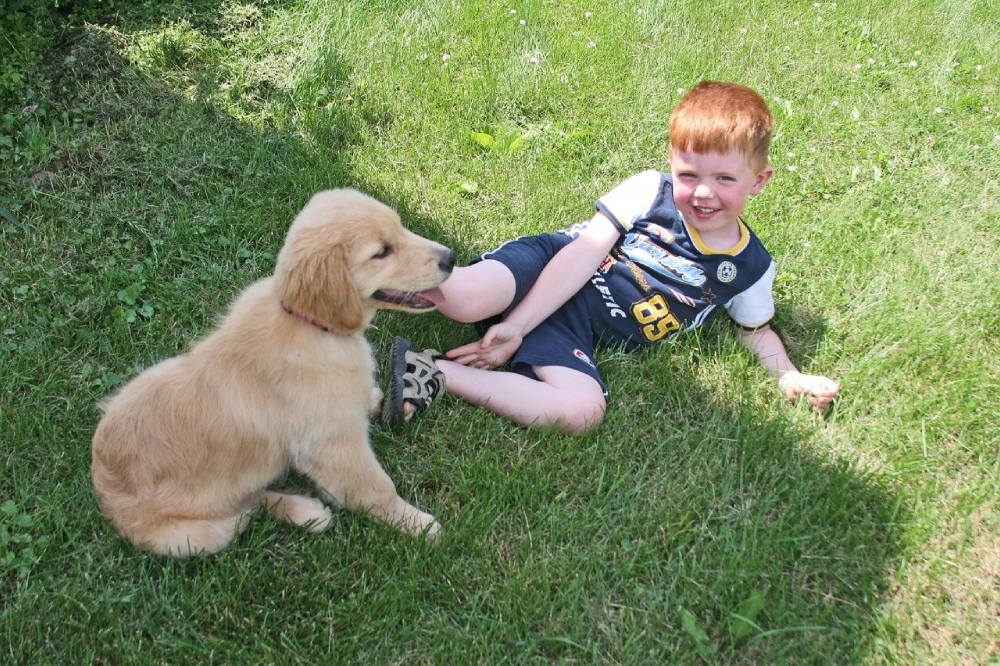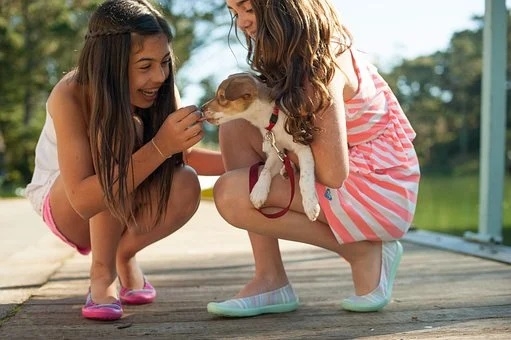When do you Introduce a Puppy to the Family?

A puppy or older dog brings many benefits to children as they can help boost your child’s esteem, nurture their sense of responsibility and help them develop empathy. On the flip side, it is important to remember that children and puppies don’t automatically have a great relationship, it has to be nurtured – with your help. You will have to teach your child how to interact with the dog and explain how the puppy will be learning to socialise. If you feel that a puppy is ideal, you need to get the puppy when is is about 10-12 weeks old as this is the optimum age to begin socialisation.

Choose the right dog
While it sounds really lovely to get a puppy who can grow up with your child, this might not be ideal if you have a very young child. Many experts believe that if your child is under the age of six, a dog aged more than two years may be preferable. An older dog takes much less time, patience and supervision than a puppy. Puppies are young and vulnerable and can be easily frightened or even injured by a well-meaning but curious child so both must be carefully supervised - do you have the time?Puppies have incredibly sharp teeth and claws which can hurt in a friendly rough and tumble. Puppies love to jump up and can easily knock a toddler or young child off balance, so good supervision is essential.
Other points to take into consideration if you are considering a puppy include the size of adult dogs of your chosen breed, how much exercise the breed needs, where the dog can sleep in the house and whether he can comfortably fit in the family car!
Other aspects include food and water, exercise and grooming and even though you are considering getting the puppy for your children, it will be you and your partner who are responsible for the puppy’s welfare. Looking after a puppy well is time-consuming and not ideal if you already feel that your life is to hectic.

Prepare for your puppy’s arrival
Whether you are introducing a puppy or dog to your home, this is going to be a difficult time as the sights, sounds and importantly, smells, are all different to your dog. Prepare a suitable sleeping place for your new pet and ensure that your garden is truly dog-proof.Have discussions with your children about the arrival of the puppy and how they must behave. Your children will need to sit quietly and not make any loud or sudden noises so that the puppy can come and say ‘hello’ to each child in their own time. The puppy should not be passed from one child to the next like a parcel as they will find this very stressful.
One person needs to be responsible for training the puppy otherwise they will get easily confused. Puppies do not always grasp their training first time and this is definitely not because they are being naughty but are just confused.
Take responsibility for the puppy
Although it is a good idea to teach your child how to care for the puppy and about the responsibility that comes with owning a pet, it is very unrealistic to expect a child of any age, to be totally responsible for the new puppy. Although you will have plenty of offers for taking the dog for a walk in the early days, in most cases, the novelty soon wears off. You will be the puppy’s main carer and you will be the one responsible for teaching and socialising your puppy as well as for his day-to-day care.
Teach both your children and puppy
Both your children and the new puppy are learning about the world and both of them will be unpredictable at times. It may come as a surprise that most children who are bitten by dogs are bitten by dogs whom they know. Both must learn how to respect the other and this will involve you spending time with them. Here are some important points to teach your children:Although the puppy looks cute and cuddly, he may well not want to be picked up and held as he could find this overwhelming and struggle to get free. Children must learn to gently stroke the puppy and not pull his ears or tail.
Puppies do not like screams and yells and these can distress them so your children need to learn to be calm and gentle near the puppy.
Even if your puppy seems very relaxed with your children, it is important that they learn how to behave properly towards dogs as one they pass in the street might not be as good tempered.
If you have bought some toys for the puppy, your child needs to know that these are for the puppy alone and that they must not put the toys in their mouth. Likewise, they should make sure that the puppy does not get to their toys and that they should be kept out of the puppy’s way.
Puppies like young children, need plenty of sleep and it is important that when they fall asleep that your children know not to disturb them as the puppy could get frightened.
If either your puppy or child is over-excited, it is probably best to keep them apart – a stair gate or dog crate can be used to keep your puppy safe and content with a dog chew for amusement.
Teach your child to leave the puppy alone when he is eating because although your child is not making a grab for his dinner, your puppy will not know so.
When your puppy and child are together, always keep an eye on things so that you can swiftly step in if either are looking unhappy or things are getting out of hand.
If you have read all this through and you are still keen to get a puppy, that is fantastic news as you will understand the commitment. As the popular television advert from some years back stated – a puppy isn’t just for Christmas’….Chrissie x

